Fugitivity, then is a desire for and a spirit of escape of the proper and the proposed. It’s a desire for the outside, for a playing or being outside, an outlaw edge proper to the now always already improper voice or instrument.
—From A Stolen Life by Fred Moten
COVID-19 has thrown the failures of liberal democracy and Enlightenment humanism into sharp relief. Against this backdrop and fueled by a heightened sense of urgency, Denniston Hill (DH) embarked on a radical re-imaging of our organization, studying what it means to be a cultural institution as the ideology of “hope” is stripped away and the violent structures that have historically sustained racial capitalism are exposed as never before. In this critical historical moment, we wanted to reassess our relationship with land, capital, and media.
We asked ourselves what is our responsibility in leveraging our collective resources to address issues that are disproportionately affecting the communities of color that nurtured us, our intellectual and creative growth. We return to the figure of the fugitive and insist on the refusal of standards imposed by a historically violent economic and political order.
Seeking to form alliances that further the long-term goals of radically equitable and inclusive social systems and working from the ground up, we are in the early phases of shifting our focus. Beyond continuing a conversation amongst voices that often go unheard, we are reframing our role in shaping community and embarking on a series of new programs.
Forging Ahead: New directions at Denniston Hill
Working in collaboration with community stakeholders—from the hyperlocal to the global—DH is preparing for the launch of several major initiatives that address food apartheid, the lack of high-speed internet in rural/underserved communities, and the regime of images that sustains the material and ideological chains of inequality.
Exodus and the Ethics of Uncertainty provide for these artist-directed initiatives. Exploring the means behind the consumption of food and the consumption of images is the central conceit. The daily experience of consuming processed images and processed food can be critically understood when one takes command of the chain of production. Denniston Hill takes a hands-on approach to learning and sowing the seeds for a liberatory practice of food and image making.
We identified four interlocking areas, which are guiding DH’s new initiatives:
Agriculture + Food Justice Program
Public Utility 2.0 (communal infrastructure & broadband)
Exodus Media Workshop & Creative Lab
Exodus Digital Porch Conversations.
These initiatives build on DH’s Residency, Swerve Conversations, Exodus Reading Group, and New Commissions Program.
Digital Porch Conversations
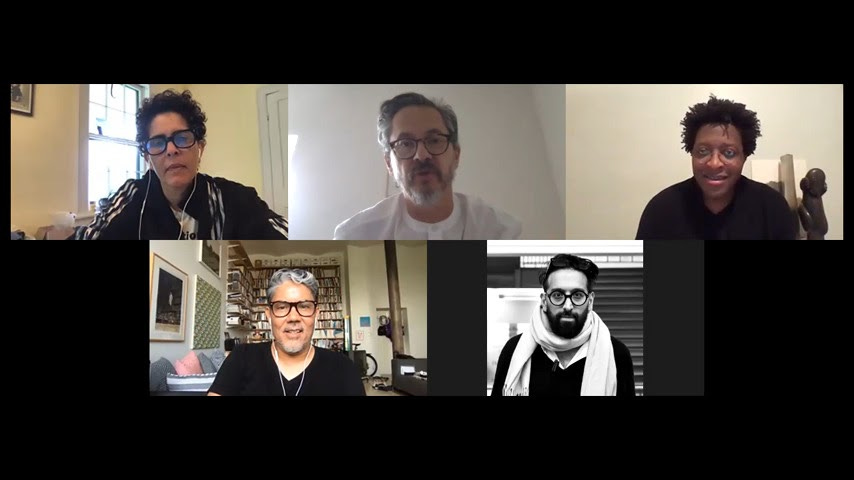
Above: Julie Mehretu, Lawrence Chua, Maxwell Mutanda, Paul Pfeiffer, and Mitesh Dixit in conversation.
Among these initiatives is DH’s Digital Porch Conversations—recorded conversations with a broad range of interlocutors that provide a safe space for “difficult” conversations to happen. These dialogues - to be shared on our website and other platforms—are informing our work and thinking
Curating groups of artists, activists and advocates, and intellectuals into conversation and commissioned written responses, Digital Porch Conversations will contribute to an ongoing, collective archive of Denniston Hill. Select, edited conversations will be made available to the general public on Swerve, our online journal of the environmental arts.
Creative Lab
With Creative Lab, artists and organizational partners will explore the theme of Exodus in relation to the mediatized environment, heightened by the impact of the quarantine orders accompanying the COVID-19 pandemic as it is experienced in the US and around the globe.
Our work on Agriculture + Food Justice
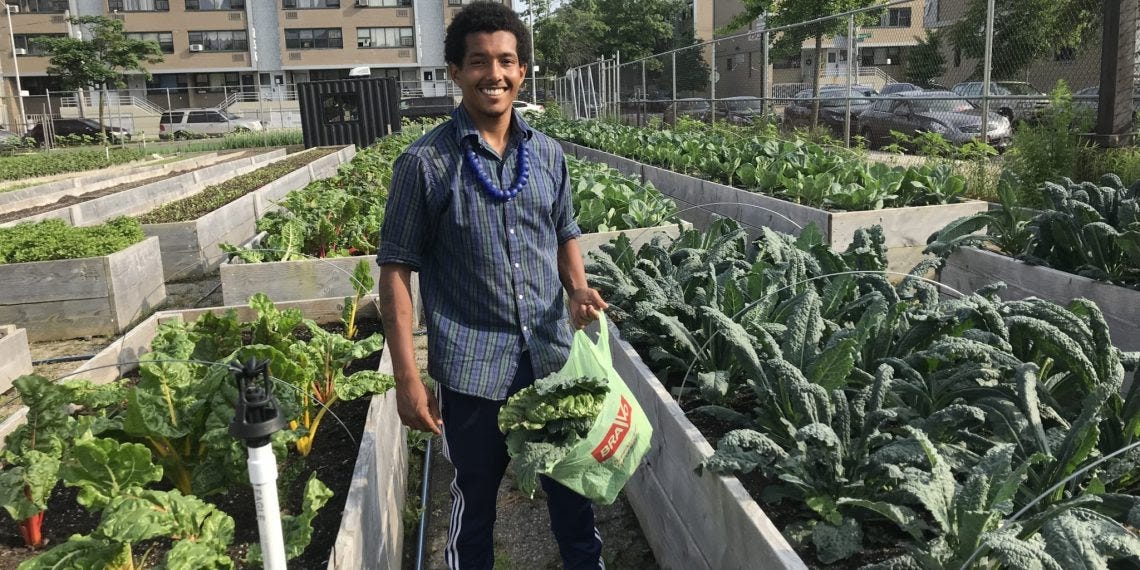
Above: Francisco Rosario, one of the longstanding farmers at Project EATS in Brownsville. Photo courtesy BK Reader.
Social inequalities lead to health inequalities and ill-being in our communities. They affect our access to fresh food, life expectancy, physical and mental well-being, quality of education, employment opportunities, income, and share of public resources. They shape our behavior and expectations, and what we perceive and believe is possible for our communities, our society, and us.
Denniston Hill is preparing to relaunch its Agriculture + Food Justice Program with a communal farm that brings local and global communities together to share skills on sustainable agriculture, activism, health, and environmental justice. And, to have agency in the food supply system as Black and Brown people. Organizations like Soul Fire Farm, Project Eats, and Northeast Farmers of Color Land Trust have been working to empower and sustain BIPOC farmers in nourishing their communities. We share the commitment of these activist-farmers/artists to raising and distributing life-giving food as a means to end food apartheid—advocating for greater food sovereignty and community self-determination.
During the Civil Rights movement of the ‘60s, Black farms of the South were important bases for the movement. They housed out-of-town organizers and offered meeting spaces for discussions. In 1967, the Freedom Farm Cooperative, founded by Fannie Lou Hamer, began as a model for cooperative living, community wellness, and self-reliance. They inspired a movement for BIPOC to reclaim farming with a sense of ancestral pride and as a mode of political resistance.
Growing out of Soul Fire Farm’s reparations map project and social justice work, the Northeast Farmers of Color Land Trust was founded in 2019 to form a coalition among the BIPOC farms in the region. They focus on building relationships and learning from Indigenous communities in the area, strengthening the infrastructure of member farms for sustainability, reclaiming and distributing land to BIPOC communities, and spreading awareness of these issues.
Land Acknowledgement
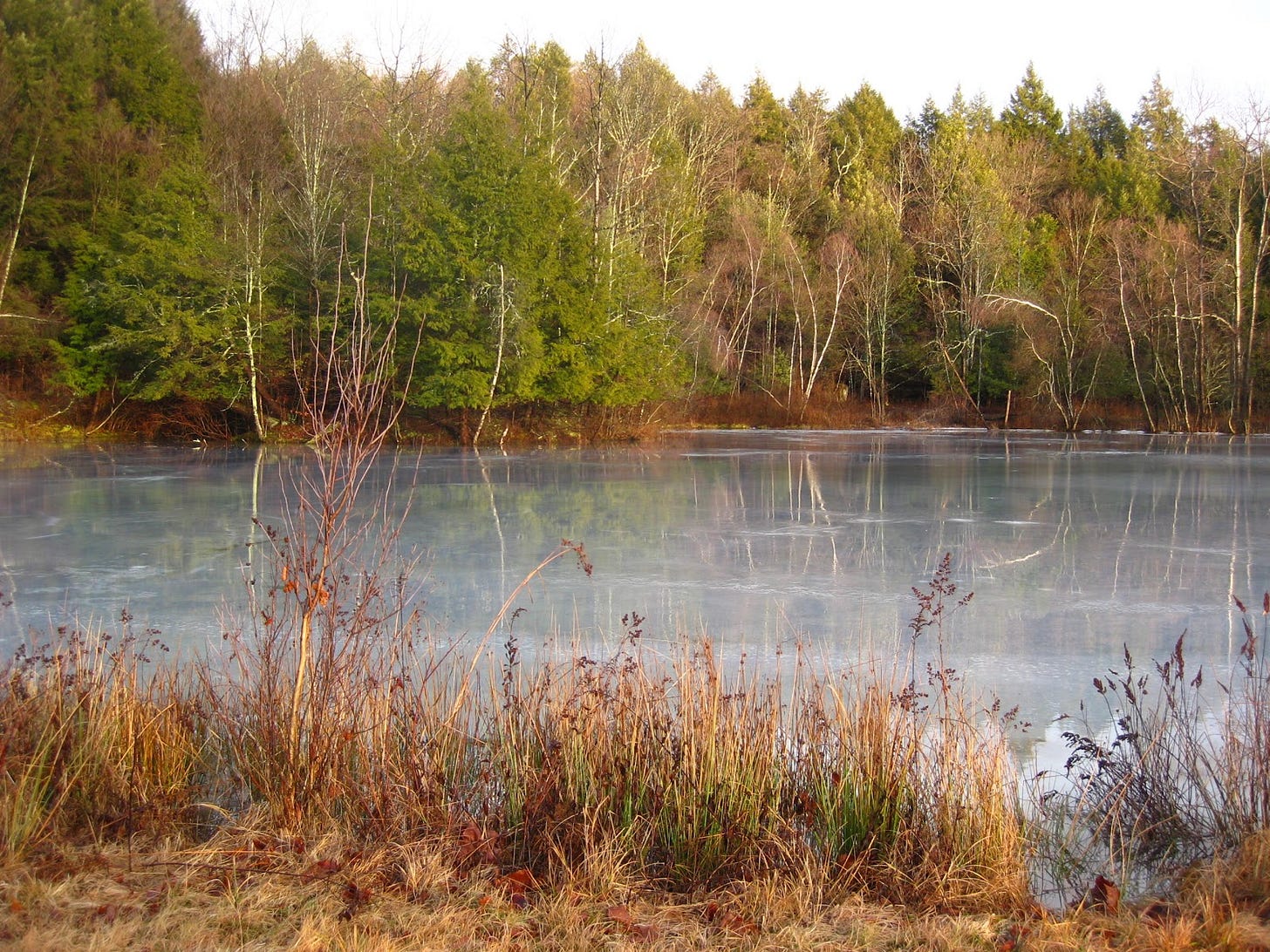
Above: A view of the pond at Denniston Hill.
With deep reverence for the land and wisdom of our ancestors, we work to reclaim our collective right to care for the land. This begins with land acknowledgement. DH acknowledges with respect and solidarity the Esopus people of the Lenapehoking, whose ancestral lands we now shoulder the responsibility of stewardship and decolonization. We acknowledge them as we acknowledge our own ancestors and their shared histories of colonialism, slavery, and genocide. The land is the living territory where these spirits from across oceans and time speak to and nourish one another.
Denniston Hill is set upon Lenapehoking whose ancestors are the Esopus peoples. Their lands included modern-day Ulster and Sullivan counties. During the Esopus Wars (September 1659–September 1663) they defended their woodlands from settlers from the New Netherland colony in and around Kingston, New York. Much of the land was lost to French Huguenot refugees in New Paltz. Today, descendants of the Esopus live on the Stockbridge-Munsee Community reservation in Shawano County, Wisconsin and among the Munsee Delaware of Ontario, Canada. Their livelihoods continue to depend on the US government as they continue tribal land claims and economic development.
Some resources we consulted and recommend:
Land Acknowledgement Resources
For local history, the Hudson Valley Tribes, and the story of the Esopus natives as well as the book: The Lenape, Archaeology, History, and Ethnography. You can look up your own location through the Native Land database.
Resources compiled by cultural institutions at landacknowledgements.org and American Indian Children Literature Blog.
Dwellings, A Spiritual History of the Living World, the poetry of novelist Linda Hogan
Roxanne Dunbar-Ortiz’ An Indigenous Peoples History of the United States.
Robin Wall Kimmerer’s Braiding Sweetgrass, Indigenous Wisdom, Scientific Knowledge and the Teachings of Plants
Edgar Villanueva’s Decolonizing Wealth
Agriculture + Food Justice Resources
Braiding Sweetgrass: Indigenous Wisdom, Scientific Knowledge, and the Teachings of Plants By Robin Wall Kimmerer
Leah Penniman, co-founder Soul Fire Farm, Farming While Black, a memoir, treatise, and guidebook on sustainable farming and its history related to the black community.
Spotlight:
Board in Conversation: The New Social Environment #79
Hosted by The Brooklyn Rail, board of directors Lawrence Chua, Julie Mehretu, and Paul Pfeiffer joined Phong Bui in conversation about the work and projects happening at DH.
kara lynch
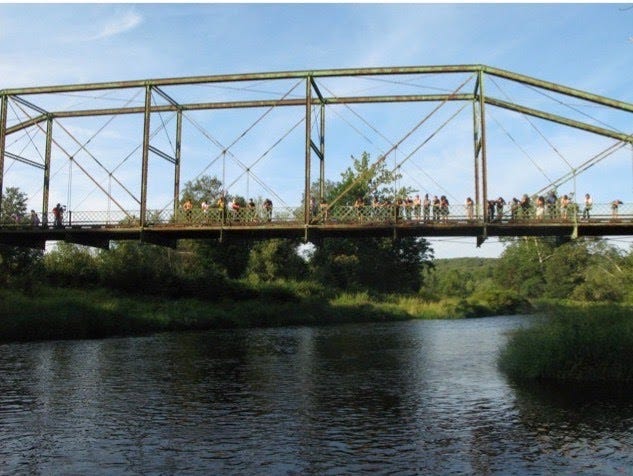
Above: kara lynch, documentation of Saved (2008), performance and sound installation, Woodridge, NY. Image courtesy of artist website.
In a 2008 residency, time-based artist kara lynch, a founding member of Denniston Hill, installed the work Saved, a sound and image invocation of the lynching of Laura and L.W. Nelson over allegedly stolen meat. The project included a procession and live singing as a healing gesture for the trauma of the events. The work was an early staging of the artist’s ongoing Invisible series, lynch’s exploration of a world in which the transatlantic slave trade did not exist.
Lily Mazzarella
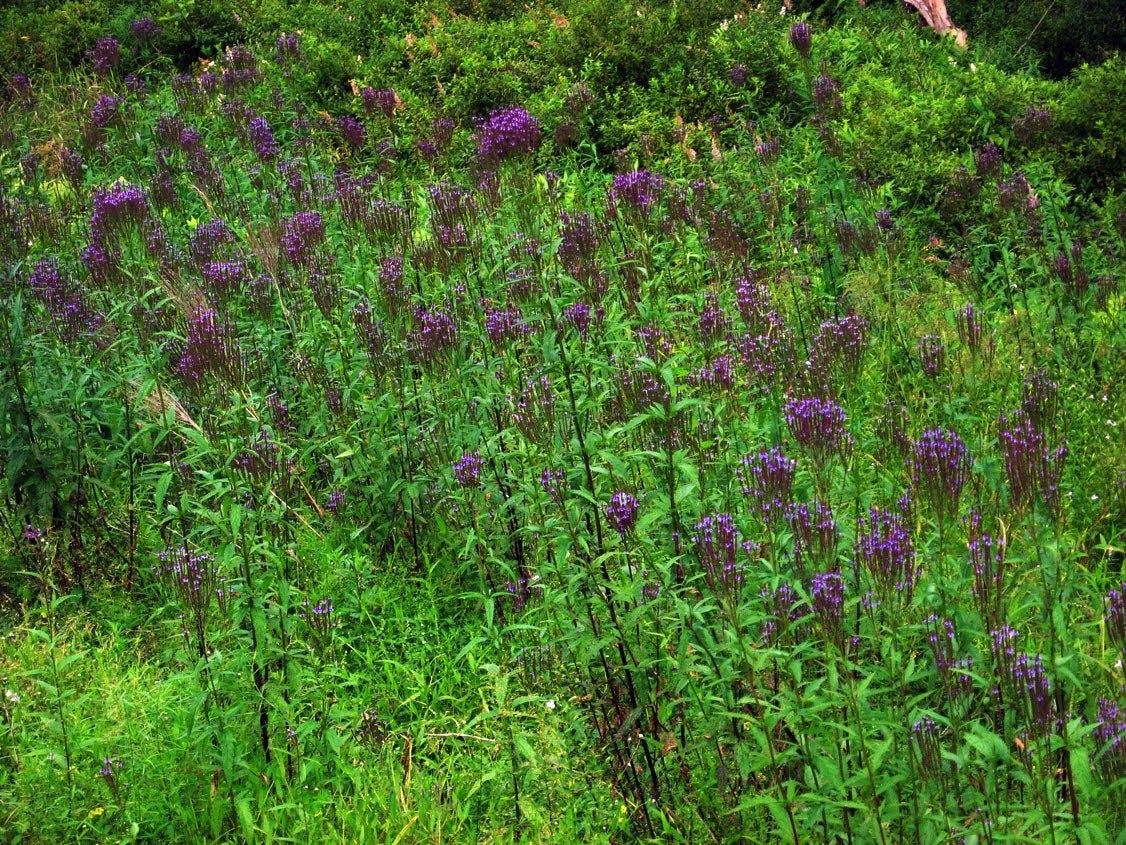
Above: Stand for blue vervain. Image courtesy of Lily Mazzarella.
Poet and herbalist Lily Mazzarella spent her 2009 residency contributing to the communal garden and indexing the medicinal plants of the area within and around Denniston Hill. Her research included classifying each plant as native, naturalized, or invasive as a way of examining the history of colonialism on the land. Within her project, one can examine how nature both carries the scars of humanity’s past and has the potential to heal it.
Sita Kuratomi Bhaumik
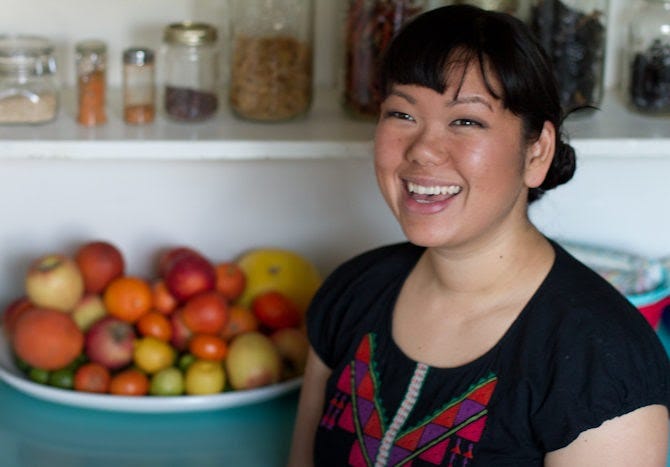
Above: Sita Kuratomi Nhaumik. Image courtesy of Kaya Press
In 2018, artist, writer, and educator Sita Kuratomi Bhaumik began work on a forthcoming book about creativity and art through Denniston Hill’s partnership with Kaya Press in San Francisco. Bhaumik is a founding member of the People’s Kitchen Collective and her practice focuses on decolonization, the hierarchy of the senses, and the impact of migration.
Upcoming Opportunities:
Creative Capital - An ongoing list of artist opportunities with upcoming deadlines in July and August, 2020.
Rivet - Previously RU Opportunities, is now a new platform: Rivet, a free online listing service delivering up-to-date information about artist residencies and opportunities worldwide.
Greenwood Cemetery Artist-in-Residence
Deadline: September 2, 2020
This nine-month-long residency will offer one artist the opportunity to create a new project or body of work inspired by beautiful natural landscape, stunning monuments, and compelling history. The residency is open to emerging or mid-career artists residing in New York City and working in the visual and/or performing arts. The artist will be provided a $7,500 honorarium, private studio space in the landmarked Fort Hamilton Gatehouse, and access to the Cemetery’s professional staff and archives and historical collections.
Deadline: September 29, 2020
In 2021 the LMCC’s Manhattan Arts Grants will once again be essential to the enlivening of our public spaces, strengthening of our social ties, and the health of our neighborhoods. In this spirit, the 2021 Manhattan Arts Grants are designed to support Manhattan artists and organizations in accessing public funds for presentations that are responsive to the needs and safety of our local communities and to amplify the cultural breadth and identity of our city.
Bemis Contemporary Art Center Fall Residency Program
Deadline: August 15, 2020
For nearly four decades, Bemis Center’s core mission has been to provide artists from around the world dedicated time, space, and resources to conduct research and to create new work across conceptual, material, performative, and social practices. The independently driven atmosphere and communal environment encourage creative growth, experimentation, confrontation of challenges, and cultivation of new ideas.
***
Denniston Hill is grateful to be supported by the Ford Foundation, The Andy Warhol Foundation for the Visual Arts, the New York State Council on the Arts, as well as numerous individuals and artists.

